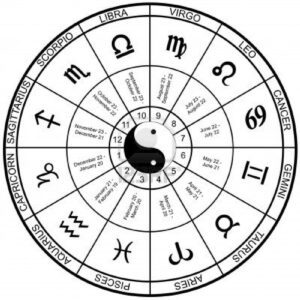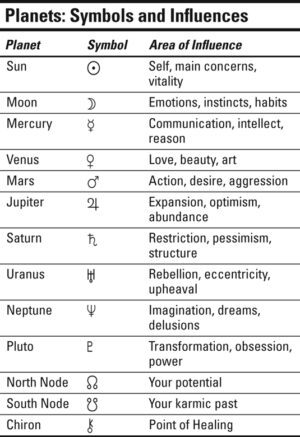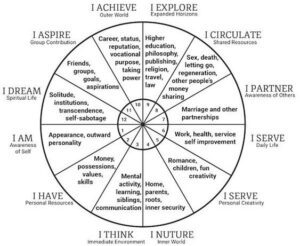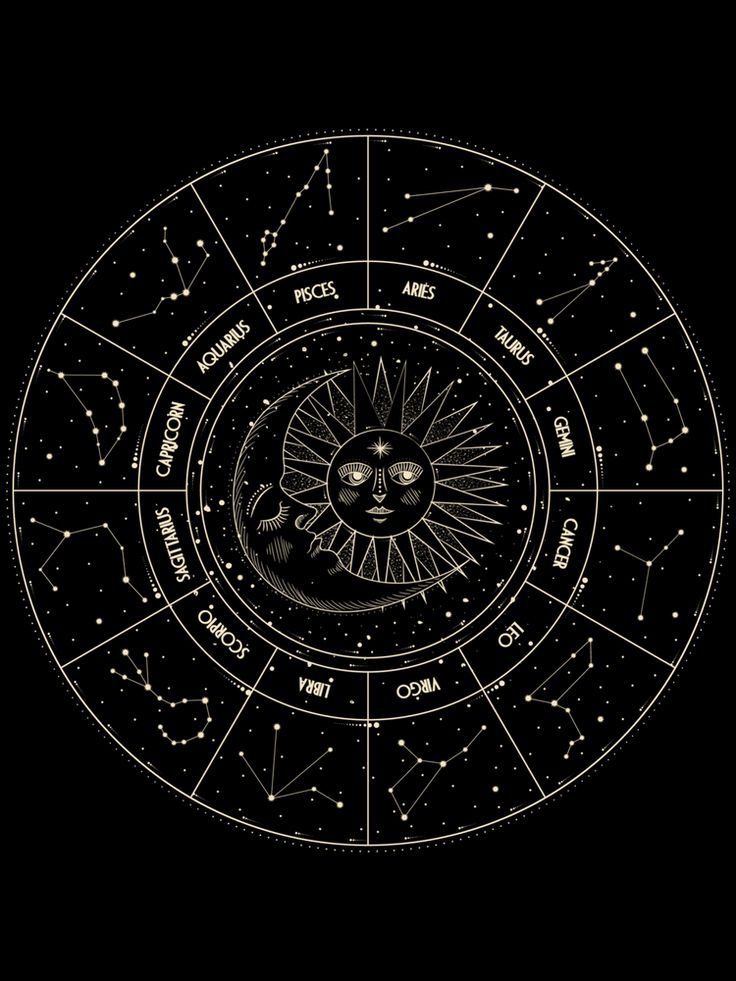If you have recently been interested in astrology, then you may be starting to realize just how complicated it is!
Astrology is a study of the stars and how they can predict someone’s personality, past, present, and future.
However, in order to figure out what you want to know about your life, you need to start with the basics.
If you would like to know more about what exactly your horoscope means or want to learn how to read your natal chart, read on!
What Is Astrology?
Astrology is the study of how distant cosmic objects may affect a person’s life. Typically, we look at planets and stars in astrology, though sometimes asteroids or other cosmic bodies are important, too.
Astrology is an ancient system that indicates the alignment of objects in the sky (like stars and planets) at a person’s birth shape their personality, impact romantic relationships, and predict economic fortunes.
To put it simply, astrology is a way of interpreting what the stars are saying about you.
But you may be wondering: how is this possible? What is astrology actually, from a physical point of view, and why would it work?
The idea is that celestial bodies create electromagnetic disturbances on earth. Sometimes, these disturbances are massive and cause extreme weather or blackouts, but astrologers believe that smaller electromagnetic disturbances happen all the time. This is how the planets influence you, even when you’re not aware of what’s happening.
In ancient times, astrology was used to predict what would happen to the people born under certain signs or what specific traits they would have because of their zodiac sign.
Ancient cultures developed their own different versions of astrology, some of which came to be the modern western form that we typically use today. Natal astrology, mundane astrology, and interrogatory astrology are all types of the western astrology form.
Eastern cultures, such as those that practice Chinese, Vedic, and Tibetan astrology, have their own different methods.
Typically, when you read about astrology online or in books, you’ll be learning about Western astrology unless another type of astrology is clearly stated. I choose to study Western astrology and will be talking about the Western type for the rest of this post.
To learn more about specific parts of astrology (the signs, planets, and houses) and how the natal chart works, read on!
Is Astrology A Science?
In short, no. Astrology is what we call a pseudoscience, which means it is not backed my proven science but by hypothetical claims and opinions.
At the same time, keep in mind that any science will be labeled a pseudoscience if it can’t be proven in a very specific way. Until recently, psychology and studies of the mind were all labeled pseudosciences!
Astrology cannot be proven through science because it’s pretty impossible to prove or disprove specific the astrology meaning of planets, signs, etc.. There’s no way to clinically prove that astrology is real.
However, there is lots of strong anecdotal evidence. Take the year 2020 as a great example. For decades (if not centuries), astrologers have been warning others about 2020, also known as the year of the Great Conjunction.
If you read more into the specifics of the predictions, it’s amazing how accurate they were! Though astrology can’t be proven in a scientific context, you can definitely see that there’s a lot of real life stuff that simply works when you look at the astrology behind it.
A Brief History Of Astrology
Astrology dates back to 3500 B.C., during the Age of Leo, in what is now known as Babylonia. The Babylonians were the first to divide the constellations into twelve signs, though the actual practice of astrology as we know it didn’t evolve until later.
In Ancient China, it was common for noblemen to read eclipses and sunspots from the sky as signs of good or bad times ahead for their emperor.
As early as the middle of the second millennium BC, Sumarians and Babylonians were keeping track of where gods were in the sky by watching planets and stars. This practice can be traced to The Venus tablet of Ammisaduqa.
The ancient Egyptians contributed the idea that patterns of stars made up constellations – that is, where the sun appears to move at a time of year.
However, it wasn’t until Alexander the Great conquered Egypt in 330 B.C. when all these ideas came together. Around this time, astrology became one full-fledged study, complete with constellations and the astrology meaning attached to them.
The way that ancient folks derived astrological meaning from the constellations was simply by watching what happened around them. For example, they may have noticed that war was more likely during Aries season, while peace was likely during Libra season. Over time, they attributed specific characteristics to each sign that stuck.
The Basics Of Astrology In The Natal Chart
Though many people only know about the sun sign, there are actually many more factors that make up the study of astrology.
All of the aspects I’m going to mention below combine to give you a clear picture of what’s happening in your life and what kind of experiences you’ll be having on a day-to-day basis.
Don’t worry if this all seems complicated – it takes most people years and years to learn how to read their own astrology chart! Focus on one piece of astrology that seems interesting to you and you’ll learn more than you realize.
The 12 Zodiac Signs
The Astrology chart Zodiac is what gives us the 12 signs that people typically know when they think about astrology.
These signs can apply to any planet or asteroid. For example, your Sun may be in Libra, but your Moon can be in Aries, your Mercury in Taurus, etc.

Most of us are familiar with our sun signs, so I’ll put the dates of the sun sign below. This means that the sun appears to be in this specific constellation (from our spot on earth) during these dates. However, every planet is always in one sign, so the layout of astrology gets complicated quickly!
#1: Aries (March 21 – April 19)
Keywords include courage, will, self focus, confident, initiate, first, hunter, enthusiasm, inspiration, vital, mission, conquer, activation.
#2: Taurus (April 20 – May 20)
Keywords include pleasure, solid, stable, security, possessions, money, beauty, loyal, stubborn, sensual, practical, patient, indulgent, enduring, storage, regulating.
#3: Gemini (May 21 – June 20)
Keywords include curious, inquisitive, intelligent, witty, cheeky mischievous, communication, perception, learning, connect the dots.
#4: Cancer (June 21 – July 22)
Keywords include sensitive, nurturing, intuitive, selfless, giving, caring, protective, moody, receptive, enfolding, containment.
#5: Leo (July 23 – August 22)
Keywords include artistic, dramatic, regal, proud, leadership, performer, expressive, creative, concentration, glowing, personality.
#6: Virgo (August 23 – September 22)
Keywords include systematic, ordered, purifying, analytical, process orientated, practical, precise, discriminating, critical.
#7: Libra (September 23 – October 22)
Keywords include art, beauty, harmony, peace, relationship, debate, cooperation, diplomacy, compromise, mediator, peacemaker, justice, fairness, balancing, sharing, partnership.
#8: Scorpio (October 23 – November 21)
Keywords include focused, driven, ambitious, emotionally intense, persistence, determination, desire, depth, magnetic, purifying.
#9: Sagittarius (November 22 – December 21)
Keywords include travel, higher learning, thirst for new experiences, philosophical, questing, seeking, teaching.
#10: Capricorn (December 22 – January 19)
Keywords include hardworking, diligent, practical, ambitious, loner, prudent, conservative, economical, achievement, goals, structural, efficiency of resources.
#11: Aquarius (January 20 – February 18)
Keywords include detached, intelligent, social, rebellious, individual, unorthodox, logical, team, utopia, groups.
#12: Pisces (February 19 – March 20)
Keywords include adaptable, compassionate, psychic, creative, spiritual, escapist, dreamer, subjective, imagination, diffusion, non-discriminatory.
The Planets In Astrology:
Planets are what give astrologers so much information about what’s going on in your life. The Sun is what we consider the ruler of the zodiac, which makes sense because it’s what gives us light. The moon and Mercury are what we consider the co-rulers, meaning that they have a lot of influence on what’s happening in your life.

Astrologers focus more on what planets are moving through what part of your horoscope – what we call transits. This is what gives you more specific information about what’s going on in your life and what to expect when certain things come around.
- The Sun – Placement of Self & Ego
- The Moon – Placement of Emotion & Feeling
- Mercury – Planet of Logic & Communication
- Venus – Planet of Attraction & Romance
- Mars – Planet of Desire & Ambition
- Jupiter – Planet of Luck & Expansion
- Saturn – Planet of Karma & Growth
- Uranus – Planet of Rebellion & Change
- Neptune – Planet of Illusion & Collective Awareness
- Pluto – Planet of Death & Transformation
In astrology, the origins of your personality are noted by your personal planets: The Sun, Moon, Mercury, Venus, and Mars. These planets show your “inner” personality.
These planets have control over things like communication, romance, and your career.
These planets orbit around the Sun much faster than the outer planets, making each individual more unique from his or her peers, because the planet changes signs quite often.
Meanwhile, the outer planets rotate much more slowly, so they tend to be generational, meaning that every else who is around your age will have the same planet in the same sign. Pluto has one of the slowest rotations, so it’s likely that everyone within a few years of your age has the exact same Pluto placement.
If you’re just starting out, I recommend that you look at the person planets first. These planets will tell you more about your personality rather than your purpose on earth as a collective generation.
However, you also have points and asteroids in addition to planets. These function much the same as planets.
Points are just a measurement based on where and when you were born, but they’re very important energetically. The 4 points in your natal chart are the Ascendant, Descendant, Midheaven, and IC.
The Ascendent rules your outer appearance and demeanor, especially in childhood, and will give you a glimpse into how other people see you.
Asteroids are really fun to learn about once you have the basics down. For example, Juno is the planet/asteroid of marriage, so Juno will tell you what you need from a partner for a long-term commitment to work. However, I recommend that you learn the basics of astrology and more about what astrology is before you delve into asteroids.
The Elements In Astrology:
These include the four basic elements that exist in astrology, which are typically associated with planets by what element they rule over. These elements include what’s known as earth, fire, water and air.
Every sign and planet is associated with an element. For example, the sign of Aries is a fire sign, so Aries is typically more masculine, active, and aggressive.
Fire and air signs are masculine and active, which means that they’re more bold, outgoing, and action-oriented. Water and air signs are feminine and passive.
However, keep in mind that these “gender” distinctions don’t actually refer to people. Instead, the energy of the signs and elements has these qualities, though the same qualities can be applied to a person of any gender.
Here are the four elements in astrology and the keywords for each element, as well as the signs that correlate with the element.
#1: Earth (Taurus, Virgo, Capricorn)
Keywords include practical, dependable, serious, enduring, stubborn, rigid, materialistic, and inflexible.
#2: Fire (Aries, Leo, Sagittarius)
Keywords include warm, outgoing, passionate, optimistic, enthusiastic, active, angry, aggressive.
#3: Water (Cancer, Scorpio, Pisces)
Keywords include nurturing, emotional, receptive, protecting, overprotective, fearful, insecure, and dependent.
#4: Air (Gemini, Libra, Aquarius)
Keywords include mental, intellectual, communicative, social, wordy, gossipy, detached, and inconsistent.
The 12 Houses:
Your birth astrology chart is a snapshot of the sky as seen from our position on earth taken at the exact moment you were born.

This natal chart is broken down into 12 segments, also known as houses. Each house shows where certain things in your life will happen.
Each house in your birth astrology chart is determined by where and when you were born, and each house is ruled by a specific astrological sign.
Houses are the basis for deciding how certain aspects of one’s life will turn out, and are especially important when it comes to careers, home life, and relationships.
The 1st House
Self Awareness – how others see you, personality, mannerisms, outer behavior, persona, mask, physical appearance, self-projection, early childhood, home environment, self-expression, health, vitality, image presented to others.
The 2nd House
Relationship to Substance — finances, possessions, personal resources, attachments, survival needs, material security, earning and spending habits, attitudes towards possessions, wealth.
The 3rd House
Communication with the Environment — mental activity, routine interactions, transmitting and receiving information, intellectual endeavors, teaching, writing, conversation, messages, correspondence, personal thoughts, the day-to-day environment, short journeys, relatives, neighbors, siblings, intimate brotherhoods or sisterhoods — consciousness groups, covens, sanghas.
The 4th House
Establishing Foundations — personal integration, home, foundation, a protected and secure environment, family, traditions, your roots, heritage, and background. The source of emotional security and wholeness, the private self, introversion, the parent who played the mother role, land, property, real estate. Private life, later life conditions, circumstances and environment, end of life, subconscious, intimate ties.
The 5th House
Creative Self-Expression — All creative extensions of yourself — children, child-bearing, the arts, dance, drama, theater, music, personal music, romance, affairs, play, recreation, pleasure, entertainment and relaxation, games, sports, hobbies, investments, gambling.
The 6th House
Self Improvement — personal reorientation, growth through crisis or sickness, analytical introspection, purification, care of the body, hygiene, nutrition, daily work environment, employment, employees, work and labor, skills and craftsmanship, service as a means of healing self and others, love and kindness to animals, self-discipline.
The 7th House
Completion through Others — what you seek in others, one-to-one or small group relationships, marriage, personal attributes of the marriage partner, dealings with others, business partnerships, legal contracts, alliances, conflict with others, litigation, cooperation or competition.
The 8th House
Transformation — the emotional consequence of a relationship, intense unions, sexual activities, death and rebirth, joint resources, investments, dowries, legacies, inheritance, wills and life insurance, delving into the unknown, psychic research, surgery, the world of the occult, sorcerers, nature’s secrets, deeply felt peak experiences, after-death experiences, psychology, attitudes toward growth and change, letting go, counseling.
The 9th House
Expansion of Awareness — the search for meaning, the higher or superconscious mind, collective thinking, abstractions, clergymen, philosophy, metaphysics, religious rituals, your belief system, ethics, and morals. Travel to distant lands, exploration, higher education, law, publishing, prophetic dreams, teachers, gurus.
The 10th House
Social Integration — your standing in the community, public life, vocation, profession, career, business, status, societal recognition, achievements, accomplishments, reputation, the parent who played the father role, authority and authority figures.
The 11th House
Social Reform — group involvement, collective endeavors, clubs and organizations, common links to others beyond space and time, social causes, ideals, progress, the common good, humanitarianism, global awareness, impersonal love, altruism, friendships, your hopes, wishes, dreams, and aspirations.
The 12th House
Transcendence — the end of the cycle where you must take care of unfinished business and resolve past karma, and come to terms with unresolved issues, ghosts from the past, places of confinement, prison, hospitals, asylum, psychological blocks, isolation, freeing yourself from past restrictions, transcending karma through grace, attaining inner peace, rendering compassionate service to humanity, retreats from the world, inner realities, universal visions, introspection, fantasies and dreams, spiritual bliss escapism, worries, sorrow, loss and suffering, the shadow self.
How To Find Your Astrological Sign/Chart
If you really want to get into astrology, I recommend that you download a copy of your astrology chart. I use the paid software iPhemeris, but you can also generate a free version on many sites (simply Google “birth astrology chart free” and you’ll pull up lots of options).

You’ll need your birth date, place, and exact time in order to generate an accurate natal chart. Make sure that you generate a natal chart in the Western astrology style.
One you’ve generated your natal chart, you will need to learn how to read each of the symbols. Look up a simple astrological symbol key.
It can be helpful to print out your natal chart and write on it as you’re learning. I used to write the name of every single symbol on the natal chart, and found that I learned to read the natal chart quite quickly this way.
Start out with the main 3: your Sun Sign, Moon Sign, and Ascendant. These three will tell you a lot about your personality when you’re first learning.
Put It Together: How To Read Your Birth Astrology Chart
Within the practice of astrology, there are many ways to understand your natal chart. I find that this explanation is often the simplest for people to follow.
The planet is the “what.” It indicates the thing that you’re trying to understand about. Sometimes, I think of the planet as being the “noun” of your natal chart.
For example, Mars is your action, your drive, your sexuality, your sense of adventure, etc.
Each planet will have a few different nouns that are correlated with the planet. You can focus on one or more of these things while you’re learning.
The zodiac sign is the “how.” It describes, like an adjective, how a planet will express itself and the qualities that it will have.
For example, Libra is usually associated with words like peaceful and cooperative. If your Mars is in Libra, your drive will probably be peaceful and cooperative.
You won’t be outwardly aggressive, so you may need to resort to passive-aggressive behaviors to fulfill your needs. Your sense of adventure may hinge more on other people or social values, because Libra is all about social placement.
Notice that, in this example, we’re still talking about Mars as the noun and Libra as the adjective. Mars sets the stage for what we’re discussing (your drive, action, sense of adventure), but Libra flavors these nouns by describing the qualities that shine through.
The house is the specific area of your life that is most affected, or the “where.” If your Mars is in the 11th house, this means you will take action and be driven to find new friend groups, since the 11th house rules friendships and large groups. However, your Mars in the 2nd house means you will be driven to obtain money and possessions.
If this all seems really complicated, don’t worry. When you first ask: what is astrology? You’ll find that there’s a whole bunch of answers. Over time, as you study your astrology chart, you’ll realize that everything eventually comes together and makes sense.


